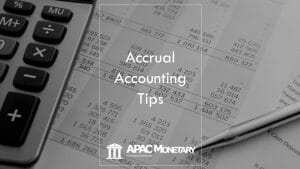Table of Contents
In this article, we will be talking about the basics of accrual accounting and how it can help your business.
Before beginning your accrual accounting journey, there are a few key concepts to understand.
One key concept is that an accounting concept justifies the usage of accruals and deferrals. In other words, you need to be sure that the use of accruals and deferrals is appropriate for your business and its transactions. This is important because improper use of accruals and deferrals can lead to inaccurate financial statements.
The second key concept to understand is the difference between cash and accrual basis accounting. Cash basis accounting records all transactions in terms of cash received or paid. This system is most commonly used by businesses that operate in a largely cash-based environment, such as small businesses or home-based businesses. On the other hand, Accrual basis accounting records all transactions in terms of net assets (assets minus liabilities). This system is more commonly used by businesses that operate in an environment with a mix of cash and assets, such as businesses that sell goods and services. Which of the following is an application of accrual accounting?
You should use accrual accounting if your business primarily operates in an environment with a mix of cash and assets.

What Is Accrual Accounting?
Accrual accounting is a financial statement recording system that calculates and records the revenues, expenses, and other financial activities since the last fiscal period. This system is important because it allows businesses to understand their current financial position better and make accurate predictions about future performance.
Under accrual accounting, revenue is recorded when an item or service is actually received by a business customer rather than when the contract for the sale has been fulfilled. Expenses are recorded when they are incurred, regardless of when the money will be paid. This system can be helpful in preventing companies from overspending on items that may not be profitable in the long run.
Overall, accrual accounting provides businesses with a more accurate picture of their current financial situation and predictions about future performance.
6 Proven Steps To Create An Accrual Accounting System
An accrual accounting system records and reports business transactions in terms of the money that has been actually received or paid as opposed to the money that was initially budgeted for. This system allows businesses to track their income and expenses more easily, identify trends, and make better financial decisions.
There are six steps you need to take to create an accrual accounting system:
1) Establish accounts
The establishment of accounts allows for accurate tracking of financial resources, informing management about the current financial situation, and providing transparency for investors. Additionally, maintaining accurate accounts can help ensure compliance with government regulations and improve organizational performance.
2) Track assets, liabilities, and equity
An important part of any business is tracking its assets, liabilities, and equity. Tracking these items allows a business to understand its financial health and make smart decisions about allocating resources. Assets represent the tangible possessions of a company, such as cash, inventory, and real estate. Liabilities are the business’s obligations to other parties, such as loans it has taken out. Equity is what remains after liabilities are paid off, and any losses reduce assets. Tracking these items can help businesses understand their financial stability and make informed decisions about growth or investment.
3) Record transactions
The purpose of accounting is to provide useful information in making decisions about how a business operates. Transactions occur all the time, and businesses need to record them so that they can be reviewed and analyzed. Transaction records can help identify problems, understand financial performance, and make informed decisions about future actions.
When transactions are recorded, it ensures that all relevant information is available for review. This includes items like revenue generated, expenses incurred, and cash flow generated or lost. It can also help identify problems with financial statements such as inaccurate balances or over- or under-reported income or expenses. Additionally, recording transactions ensures accuracy when auditing the business’s books.
Recording transactions helps businesses run more efficiently and effectively by providing valuable information on their operations.
4) Allocate resources based on earned income
One of the most important steps in managing any business is ensuring that resources are allocated in a way that best suits the organization’s needs. One way to do this is to base resource allocation decisions on earned income.
Earned income is money earned through activities within a business, such as sales, services rendered, or product production. When resources are allocated based on earned income, it ensures that all revenue from operations is considered and used to best benefit the company. This helps businesses stay organized and efficient while ensuring that they are using their resources in the most effective way possible.
5) Calculate profit or loss
There are many reasons why you should calculate profit or loss. Profit and loss tell you how much money your business has earned and lost in a given period of time. Profit and loss also help you decide whether your business is making a profit or losing money.
In addition, profit and loss can help you measure the effectiveness of your marketing campaigns and determine whether you need to make any changes to your operations.
6) Settle accounts at the end of each fiscal year
Settling accounts at the end of each fiscal year is a practice that has been followed in the accounting profession for many years. There are several reasons why settling accounts at the end of each fiscal year is beneficial. First, it ensures that all transactions and balances are recorded accurately.
Second, it helps to keep track of financial position and liquidity.
Finally, settling accounts at the end of each fiscal year allows for accurate planning and forecasting.
Once you have completed these steps, your business will be ready to start recording its financial transactions in an accrual format.
How Do You Calculate Accrual Basis?
Accrual basis accounting is a method of accounting used in businesses to record and report financial transactions on a periodic basis. Under the accrual basis, income is recognized when it is received or when it is due rather than when money actually changes hands. This allows businesses to track actual cash flows and better assess their financial performance.
Under the accrual basis, each transaction must be recorded in a specific account and generally must be matched with an associated credit or debit entry in another account. For example, if a business sells goods for $10,000 and receives a payment of $9,000 two weeks later, the $1,000 difference would be recorded as an income gain on the sale of goods account and as a debit entry on the cash flow from the operations account. To track assets and liabilities more accurately under the accrual basis, each asset must also have an associated liability account.
The main advantage of using the accrual basis is that it provides companies with accurate financial data that can be used to make sound business decisions.
Additionally, by tracking actual cash flows instead of waiting until the money actually changes hands (as under traditional accounting), businesses are less likely to overspend or underspend on their investments.

There are three main types of accrual basis accounting: cash, accrual, and hybrid.
On a cash basis, all transactions are recorded as cash receipts and cash payments. This is the most common type of accounting and is generally used by small businesses that do not deal with a lot of credit or debit transactions.
Under the accrual basis, each transaction must be recorded in a specific account and generally must be matched with an associated credit or debit entry in another account. For example, if a business sells goods for $10,000 and receives a payment of $9,000 two weeks later, the $1,000 difference would be recorded as an income gain on the sale of goods account and as a debit entry on the cash flow from the operations account. To track assets and liabilities more accurately under the accrual basis, each asset must also have an associated liability account.
The main advantage of using the accrual basis is that it provides companies with accurate financial data that can be used to make sound business decisions. Additionally, by tracking actual cash flows instead of waiting until the money actually changes hands (as under traditional accounting), businesses are less likely to overspend or underspend on their investments.
Under the hybrid basis, some transactions are recorded under the accrual basis, while others are recorded under the traditional accounting system. For example, if a company sells goods for $10,000 but pays for them using promissory notes that require immediate payment of $9,000 upon receipt of goods, then both amounts would be treated as sales transactions and would go into both accounts–the income from sale account would increase by $1,000 ($10k – $9k = $1000) while outstanding debt would decrease by $1,000 ($10k – 9k = -$1000).

What Are The Advantages Of Using Accrual Accounting?
The use of accrual accounting allows businesses to track the financial progress of their operations by recording expenses when they are incurred and adding them to a company’s overall liabilities.
This method is often seen as more accurate than cash accounting, as it takes into account the timing of when money is actually spent.
Additionally, accrual accounting can help companies plan for future expenses and make better decisions about allocating resources.

How Do You Create An Accrual Accounting System That Works For Your Business?
An accrual accounting system records and tracks a business’s financial transactions as they happen, rather than waiting until a particular event, like an invoice being sent, has occurred. This type of system makes it easier for businesses to track their expenses and figure out how much money they have left over at the end of each month.
There are a few different ways to create an accrual accounting system, but the most common way is to use accounts receivable, accounts payable, and inventory as your foundation. Each account will have a corresponding ledger entry that records when the transaction occurred and what amount was involved.
This type of accounting makes it easy to see which expenses are going up or down over time and helps businesses stay on track with their finances.

Why Would You Defer Revenue Or Expenses?
When a business makes a sale, they receive the money paid for the product or service. The money is credited to their account and can be used to pay bills, make investments, etc. When a business incurs expenses such as salaries, rent, utilities, and other necessary costs of doing business- they are required to record these expenses and hand over the corresponding cash balance at the end of each month.
There are many reasons why businesses might choose to defer revenue or expenses. For example, if sales are slower than anticipated and it’s not clear when they’ll pick up again- deferring some revenue could help prevent a deficit from developing. Alternatively- if it’s determined that an expense will occur in the future but wasn’t budgeted for now- deferring that expense could save money in the long run.

What Are The Differences Between Cash And Accrual Basis Accounting?
Cash basis accounting is the most common form of accounting in the United States. Under this type of accounting, businesses record all transactions in cash and do not account for any liabilities or assets until they have been paid. This means that companies can often have more immediate access to cash than they would under an accrual basis system, which records liabilities and assets as they are incurred.
Under an accrual basis system, a company would account for revenue when it is earned rather than received. This can lead to different financial results because companies may be able to sell products or services before they have been paid for them. For example, a company might sell widgets before it has received payment for them from a customer.
There are several advantages to using an accrual basis system over a cash basis system.
First, under an accrual basis system, companies can more accurately track their financial progress over time. This is because liabilities and assets are recorded as they are incurred rather than when money actually changes hands.
Second, under an accrual basis system, companies can better manage their finances by knowing how much money they have available at any given time. This is because liabilities and assets are recorded as earned rather than when money changes hands.
Finally, using an accrual basis system can help a company avoid problems with bookkeeping. This is because liabilities and assets are accounted for in the same way, regardless of whether they are paid in cash or by a later accrual.

What Other Benefits Does Accrual Accounting Offer?
Accrual accounting is a financial accounting system in which assets, liabilities, and expenses are recorded and reported based on the time they are incurred, not when the money is paid. This type of accounting system helps businesses manage their finances more efficiently by tracking how much money they have at different points in time.
Additionally, accrual accounting provides companies with other benefits, such as improved ability to predict future cash flow needs and improved accuracy when making decisions about investments.
How To Choose The Right Accounting System For Your Business
Choosing the right accounting system for your business can be a daunting task. There are a variety of different systems available, and it can be hard to decide which one is right for your business. Here are some tips to help you choose the right system:
First, take into account what you need your system to do. Do you need to track income and expenses? Do you need to manage financial statements? If so, which features of a particular system are most important to you?
Next, consider how much money your business will be spending on accounting services in the near future. If you’re not sure yet, contact an accountant or accountant-counselor who can give you an estimate of the cost of using a specific system.
Finally, look at reviews of different systems and decide which one feels most comfortable for you. Ultimately, it’s up to you as the owner of the business to choose what system is best for it.

Conclusion
Accrual accounting is a great way to track your business’s revenue and expenses. It offers many benefits, including transparency and accountability. By choosing the right accounting system for your business, you can maximize these benefits.
Accrual accounting is a financial accounting method that recognizes revenue and expenses when they are earned rather than when the money is actually paid. This allows businesses to better plan for their future financial needs and makes better decisions about where to allocate their resources.
One benefit of using accrual accounting is that it can improve transparency and accountability. When businesses account for revenue and expenses as they are earned, customers and shareholders can more easily see how the company is performing financially. This helps ensure that companies are able to meet their obligations and maintain a good reputation.
Another important reason to use accrual accounting is that it can help businesses save on costs associated with cash flow management. By tracking revenue and expenses as they are earned, businesses can avoid having to pay interest on loans or spend money on unnecessary overhead costs. Overall, accrual accounting provides many benefits that make it an ideal method for managing business finances.











